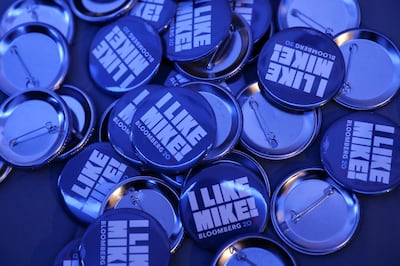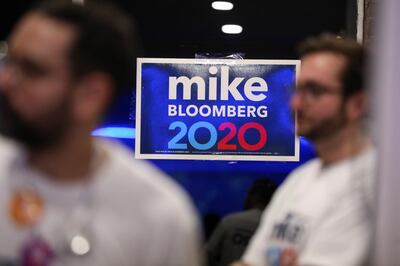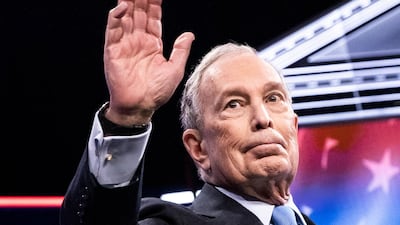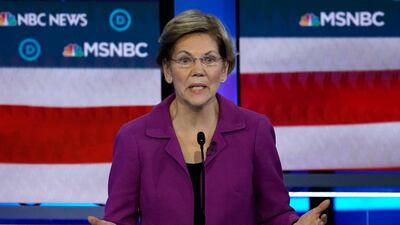In November 2019 former New York City mayor Mike Bloomberg announced his decision to run for the presidency of the United States.
The billionaire philanthropist, 78, and media magnate hopes to take on fellow billionaire Donald Trump in November.
But Mr Bloomberg is something of an anomaly that is raising questions about American elections.
Without personal spending limits in the US race, he has so far used $350 million (Dh1.29 billion) of his $60bn fortune on TV and digital advertisements.
That figure does not include grey areas such as "influencers" on Instagram.
The amount Mr Bloomberg has spent before even becoming the Democratic candidate vastly outstrips the $66m Mr Trump paid out of his pocket in 2016.
While US politics has long been big business, with billions of dollars spent on campaigns, never has such a large deluge of money poured into campaigns from single sources even before the official race has begun.
Mr Bloomberg has no need to raise funds and he's targeting his campaign on states with high delegate counts, such as California or Texas, which vote in March, rather than trying to win each vote.
He is also trading on his name recognition, which is high from his years in the spotlight and his global news brand Bloomberg.
Being well known is an electoral phenomenon relying not on the power of persuasion but the power of pure saturation.
Mr Bloomberg is placed in the top four Democratic candidates in many of the Super Tuesday races, when 14 states vote on the same day. In Texas, he is hovering between second and third, in California, he is joint second and he is second in North Carolina.
He's leading in Florida and fourth in Ohio, second in Georgia and New Jersey, and is among the leaders in Pennsylvania, whose primaries all fall after Super Tuesday.
In many ways, Mr Bloomberg isn't a traditional candidate.

He has flipped between being a Republican, a Democrat and an independent over the years.
He hopes to offer Democratic party members a "moderate" alternative to the espoused socialism of Mr Sanders and capture the so-called centre ground vacated by the divisive Mr Trump in the run-up to November.
Mr Bloomberg has recognised he is different to the Democratic voters he's asking to trust him in the election. "The polls say that the moderate voters in the Democratic Party are much more liberal than me," he said recently.
But it remains to be seen whether those moderate voters will back a candidate to their centre-right over one to the left.
So far, Mr Bloomberg's strategy of massive spending and brand recognition has had some success.
Recent polling data from Quinnipiac University shows his popularity is second only to former vice president Joe Biden and Bloomberg leads him in Hispanic support.
This is despite the hashtag #BloombergIsRacist trending online after comments made at the Aspen Institute in 2015 resurfaced.
At the time, Mr Bloomberg said “95 per cent of your murders – murderers and murder victims – fit one MO. You can just take the description, Xerox it and pass it out to all the cops. They are male, minorities, 16 to 25. That’s true in New York, that’s true in virtually every city.”
In the same speech, Mr Bloomberg said he put police officers in minority neighbourhoods because that's where all the crime was and suggested the way to get guns out of the hands of children was "to throw them up against the wall and frisk them".
These remarks came when he was mayor of New York, when he enacted a stop-and-frisk policy. At its peak, in 2011, 700,000 people were searched but the policy was decried as racist for disproportionately affecting black people.
In 2013, a federal judge said the tactic amounted to a policy of indirect racial profiling as 90 per cent of people stopped were released without police finding any basis for a summons or arrest.
The same year, Mr Bloomberg said officers “disproportionately stop whites too much and minorities too little” and resisted criticism.
Since entering this year's presidential campaign he has apologised for the policy.
Under Mr Bloomberg's mayoral administration, law enforcement in New York City also used the city’s mosques and public spaces as a laboratory for surveillance and predictive policing technology in counter-terrorism. Despite accusations it was invasive and Islamophobic, he has defended the policy.
For voters, there is also now likely to be a big question mark about the 40 sexual discrimination and harassment claims against him or Bloomberg LP from 64 women. Mr Biden will also face questions about the eight harassment claims against him.
Mr Trump was similarly grilled about the 43 cases against him in 2016, although it ultimately did not stop him getting to the White House.
Last week, Elizabeth Warren, a US senator and Democratic candidate, pressed Mr Bloomberg on non-disclosure agreements reached with three claimants and he refused to say he would release them of those obligations.
“For all I know, the other side wouldn’t want to get out of it,” he said.
On February 21, Mr Bloomberg said he would permit his company to release the three women.
"I've done a lot of reflecting on this issue over the past few days and I've decided that for as long as I'm running the company, we won't offer confidentiality agreements to resolve claims of sexual harassment or misconduct going forward," he said.
In a field currently led by Mr Sanders, who espouses a higher minimum wage, universal health care and tackling big business, Mr Bloomberg is a stark contrast.
He has argued against raising the minimum wage or increasing taxes on businesses or the rich. He has criticised Medicare-for-all as too expensive and said Ms Warren's proposed wealth tax was likely unconstitutional.

He has also criticised progressives’ approach to big business and specifically singled out Ms Warren’s push to break up the banks as a bad idea.
But on other issues, he is more in line with the democratic pack.
In 2013, he founded Everytown for Gun Safety, a non-profit group that advocates gun control and that he continues to fund. He has also expressed optimism about the Green New Deal proposal from congressional Democrats and said all the elements deserved consideration. But he warned "things that are pie in the sky" should not be put forward.
Within the party machine, Mr Bloomberg has a lot of allies. For years he has paid large donations to campaigns and the party, as well as funding grants and philanthropic gifts.
This kind of influence over Democratic members means that at the Democratic National Convention in July, Mr Bloomberg has a favourable advantage over Mr Sanders and Ms Warren among party insiders.














